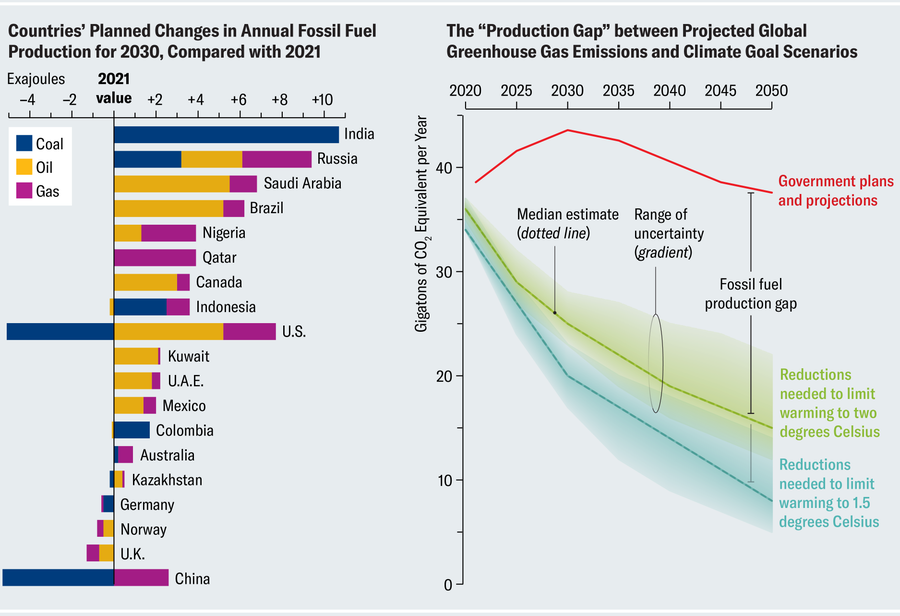The United Nations Climate Change Conference ended last month, and its small successes could barely mask its failure to face a worsening climate catastrophe. COP28 highlights included more than 120 countries pledging to triple their renewable energy capacity by 2030 and several countries pledging a total of $700 million to a loss and damage fund compensating vulnerable communities after climate disasters. Nearly 200 countries agreed to transition “away from fossil fuels in energy systems in a just, orderly and equitable manner.”
Unfortunately, the meeting provided neither a timeline nor assurance that the goal of the 2015 Paris Agreement—limiting global warming to 1.5 or two degrees Celsius—will be met. Incredibly, some of the countries calling for a phasedown of fossil fuels, including the U.S., are actually planning to expand their production of oil and gas. A “transition,” to oil-producing countries, seems to mean staying in business until demand drops. The tepid response to this looming catastrophe is a grave mistake; it’s time for bold, uncompromising action.
Thus COP28 offers little hope for substantial deviation from current stagnant efforts to avert disaster. Many of its apparent successes come with worrisome caveats. Two of the biggest climate polluters, China and India, did not, for example, sign the pledge to triple their renewable energy capacity, possibly because of its anti-coal language. Further, some athletes earn more than their respective countries’ national COP28 Loss and Damage Fund pledge. These pledges are a pittance that, in total, account for just a fraction of a percent of the annual climate-related damages faced by developing countries. Even worse, the agreement to transition away from fossil fuels lacks teeth: it sidesteps legal obligations, omits clear timelines and investment targets and, shockingly, neglects to demand a phasing-out of fossil fuels that had been backed by more than 100 nations.
On supporting science journalism
If you're enjoying this article, consider supporting our award-winning journalism by subscribing. By purchasing a subscription you are helping to ensure the future of impactful stories about the discoveries and ideas shaping our world today.
“Life on planet Earth is under siege. We are now in an uncharted territory,” we wrote in a 2023 state-of-the-climate report. We are, therefore, deeply concerned that some policymakers and world leaders have gone far off track on addressing climate change. During the conference, the COP28 president criticized the idea of a fossil fuel phaseout. COP resolutions require total consensus, so they can easily be watered down by petrostates that profit greatly from fossil fuels.
After decades of insufficient action, we are now experiencing a climate emergency. In 2023 alone, many climate-related disasters struck, including unprecedented heat waves, wildfires, storms and flooding. For example, climate change likely intensified Storm Daniel, which killed thousands of people this past September, primarily in Libya. Extreme heat was a particular concern for migrant workers preparing COP28 sites, with reports of laborers working outside in potentially fatal 42-degree-C (107-degree-Fahrenheit) temperatures. As climate change worsens and we venture further into uncharted territory, some scientists are warning that we are on track for potentially one billion climate-related deaths while others have raised concerns about even more disastrous outcomes.
Despite decades of promises made at conferences like COP28, shockingly little climate mitigation has come from world leaders, in an abdication of responsibility that will echo across centuries. Rather, fossil-fuel emissions have soared and are now at near-record levels. The rapid growth of coal-related CO2 emissions is particularly troubling because coal accounts for roughly 40 percent of global CO2 emissions. Total coal emissions are presently at near-record levels.
As shown in the graphic below, many of the world’s major fossil-fuel-producing countries actually plan to dramatically ramp up production by 2030, although there are some exceptions. Total future global fossil-fuel emissions projections look equally grim. For example, the U.S. plans to increase annual oil production by roughly 5.2 exajoules—the equivalent of roughly 900 million barrels of oil, albeit with a corresponding decrease in coal production. The largest fossil fuel production increase is projected in India: approximately 10.7 exajoules in coal-related energy (1.86 billion barrels of oil equivalent). These increases are driving a widening fossil fuel “production gap” between our current pathway and what is needed to limit average global warming to two degrees C.

Credit: Amanda Montañez; Source: The Production Gap: Phasing Down or Phasing Up? Top Fossil Fuel Producers Plan Even More Extraction despite Climate Promises. Stockholm Environment Institute, Climate Analytics, E3G, International Institute for Sustainable Development and United Nations Environment Program, 2023
As the fossil fuel production gap continues to soar and limiting warming to 1.5 degrees C becomes increasingly unrealistic, a massive 2.8-degree-C warming is expected by the end of the century. Together with the failure to agree on a fossil fuel phaseout at COP28, this suggests that some world leaders may not yet have come to grips with the climate crisis. We instead face a troubling future steered into by climate policies unguided by science.
Our predicament is only partly caused by oil-rich nations and the super-rich benefiting greatly from the status quo. Simply comprehending the scale of climate impacts—potentially synchronized global crop failures, the destruction of low-lying island nations, intense geopolitical conflict and hundreds of millions of deaths this century—poses another challenge. Perhaps the only silver lining in the rising incidence of climate-related disasters is that awareness of these catastrophic risks may be growing.
The first step to dealing with a problem is to understand the problem itself. The widening fossil fuel production gap and general lack of significant developments at COP28 (and most previous COPs) suggests that some leaders and policymakers may not yet appreciate the severity of the climate crisis, even as a many countries have called for a fossil fuel phaseout. COPs focus the world’s attention on the accelerating catastrophe of global heating. This is important yet not enough. We need effective solutions, including forming coalitions of willing countries, implementing carbon pricing, reducing fossil subsidies and investing heavily in renewables to make fossil fuels obsolete. Any genuine strategy to address global warming must ultimately go beyond words and voting—it should include a thorough execution plan with defined goals, explicit measures and mechanisms to ensure accountability for outcomes, all while prioritizing equity and social justice. This will require genuine leadership.
This is an opinion and analysis article, and the views expressed by the author or authors are not necessarily those of Scientific American.
